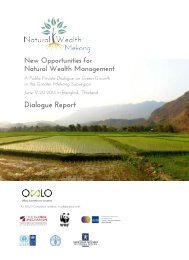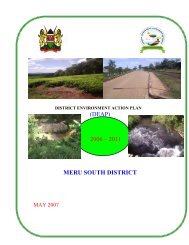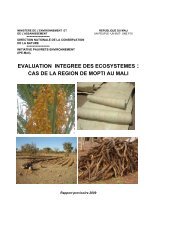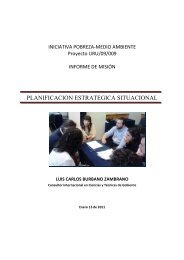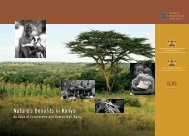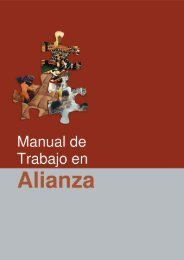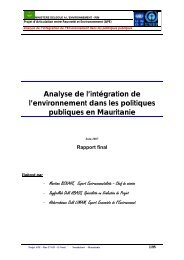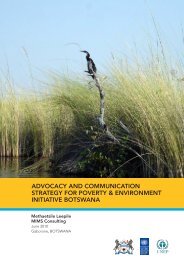WORKSHOP REPORT - UNDP-UNEP Poverty Environment Initiative
WORKSHOP REPORT - UNDP-UNEP Poverty Environment Initiative
WORKSHOP REPORT - UNDP-UNEP Poverty Environment Initiative
Create successful ePaper yourself
Turn your PDF publications into a flip-book with our unique Google optimized e-Paper software.
GOB-<strong>UNDP</strong>-<strong>UNEP</strong> <strong>Poverty</strong> <strong>Environment</strong> <strong>Initiative</strong><br />
Table 2: Feedback on visioning exercise<br />
Vision Approach / Responsible Institution<br />
Group 1: A prosperous Botswana that utilises its<br />
natural capital sustainably to achieve a healthy<br />
nation by 2050.<br />
Group 2: Vision: Botswana will be a knowledge<br />
based society and high income society with all<br />
necessary Infrastructure in place. Botswana will<br />
have household food security for healthy life<br />
and poverty will be reduced to 5%;<br />
Unemployment under 5%; and be a disciplined,<br />
moral and fully inclusive society.<br />
Group 3: Our dream for 2050 is that every<br />
household is using renewable energy. The<br />
country is self-sufficient in food production.<br />
Botswana has high quality of life for everyone.<br />
Improved infrastructure, access to good<br />
housing, access to enough food, access to<br />
Health, access to education.<br />
Group 4: We want Botswana to have a fully<br />
fledged integrated socio-economic zones by<br />
2050 (depends on global responsibility).<br />
� Economic diversification (MFDP).<br />
� Promote tourism (DOT / BTB / Private<br />
Sector).<br />
� Commercialisation of agriculture (MOA and<br />
Independent Body spearheading<br />
commercialisation).<br />
� Innovation hub.<br />
Road Map:<br />
2010-2019: Full integration of environmental<br />
issues in development planning.<br />
2020-2029: Resource management in place<br />
(CSO). World class education system in place.<br />
Inclusive development.<br />
2030-2039: <strong>Environment</strong>ally friendly energy<br />
sources.<br />
2010: Revised the current policies. Educated the<br />
community, private sectors etc. since<br />
stakeholders need to be engaged. Towards food<br />
security, quality of life for all rid of<br />
unemployment.<br />
2020: Renewable energy and food security.<br />
2030: Food security: export agricultural<br />
products. Subsistence farming transformed into<br />
commercial farming.<br />
Infrastructure development: light rail/magnetic<br />
systems/trams. Full exploration of potential<br />
mines. Advanced technology.<br />
Human Resource Development: Changed<br />
mindset. Free education. High Life expectancy.<br />
Ecology: Natural capital to support the socioeconomic<br />
aspects of development.<br />
Good governance.<br />
General comments plenary session:<br />
Discussion emanating from the presentations is as below:<br />
� How do we define development? Should we talk about quality of life<br />
instead?<br />
� How can we have zero unemployment?<br />
� What is the definition of employment. Response: we measure people who<br />
are capable of working and are seeking employment but are not having<br />
work.<br />
� We should also take in account trans-boundary pollution.<br />
� How can development be sustainable if we always talk about economic<br />
growth?<br />
� With defining a vision we look at how it will happen, when it will happen and<br />
what the steps are. We can’t divorce ourselves from international pollution.<br />
� We cannot talk about ridding unemployment and pollution.<br />
9



